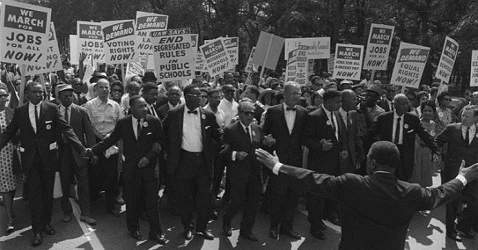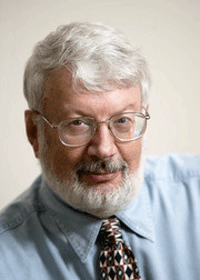From Common Dreams

Civil rights and union leaders, including Martin Luther King Jr., Joseph L. Rauh Jr., Whitney Young, Roy Wilkins, A. Philip Randolph, Walter Reuther, and Sam Weinblatt, take part in the March on Washington for Jobs and Freedom on August 28, 1963.
(Image by (Photo: Public Domain)) Details DMCA
Most Americans today know that Reverend Martin Luther King Jr. was killed in Memphis, Tennessee in 1968, but few know why he was there. King went to Memphis to support African American garbage workers, who were on strike to protest unsafe conditions, abusive white supervisors, and low wages -- and to gain recognition for their union. Their picket signs relayed a simple but profound message: "I Am A Man."
Today we view King as something of a saint, his birthday a national holiday, and his name adorning schools and street signs. But in his day, the establishment considered King a dangerous troublemaker. He was harassed by the FBI and vilified in the media. He began his activism in Montgomery, Alabama, as a crusader against the nation's racial caste system, but the struggle for civil rights radicalized him into a fighter for broader economic and social justice.
As we celebrate Labor Day on Monday, let's remember that King was committed to building bridges between the civil rights and labor movements.
Invited to address the AFL-CIO's annual convention in 1961, King observed:
"Our needs are identical with labor's needs: decent wages, fair working conditions, livable housing, old-age security, health and welfare measures, conditions in which families can grow, have education for their children, and respect in the community. That is why Negroes support labor's demands and fight laws which curb labor. That is why the labor-hater and labor-baiter is virtually always a twin-headed creature spewing anti-Negro epithets from one mouth and anti-labor propaganda from the other mouth."
He added:
"The labor movement did not diminish the strength of the nation but enlarged it. By raising the living standards of millions, labor miraculously created a market for industry and lifted the whole nation to undreamed of levels of production. Those who today attack labor forget these simple truths, but history remembers them."
Several major unions reciprocated King's support. When he was jailed in Birmingham for participating in civil disobedience, it was Walter Reuther, the charismatic leader of the United Auto Workers (UAW) union, who paid his bail.
Several major unions, especially the UAW and the International Ladies Garment Workers, had donated money to civil rights groups, supported the sit-ins and freedom rides, and helped organize the massive 1963 March on Washington, where King delivered his famous "I Have a Dream" speech.
We often forget that its official name was the March on Washington for Jobs and Freedom and that its manifesto called on Congress not only to pass a civil rights bill but also "a national minimum wage act that will give all Americans a decent standard of living." The manifesto pointed out that "anything less than $2.00 an hour fails to do this."
In 1963, the minimum wage was $1.25 -- the equivalent of $9.97 in today's dollars. A $2 minimum wage in 1963 would be $15.95 an hour today.
In the 1960s, the sit-ins (a tactic adopted from workers' sit-down strikes in the 1930s), Freedom Rides, mass marches, and voter registration drives eventually led Congress to enact the Civil Rights Act of 1964 and the Voting Rights Act of 1965. King was proud of the civil rights movement's success in winning the passage of those important laws. But he realized that neither law did much to provide better jobs or housing for the large numbers of low-income African Americans in the cities and rural areas. He recognized the limits of breaking down legal segregation.
"What does it profit a man to be able to eat at an integrated lunch counter if he doesn't earn enough money to buy a hamburger and a cup of coffee?" King asked.
King observed: "Negroes are not the only poor in the nation. There are nearly twice as many white poor as Negro, and therefore the struggle against poverty is not involved solely with color or racial discrimination but with elementary economic justice." To achieve economic justice, King said, "there must be a better distribution of wealth within this country for all God's children."
"There is nothing but a lack of social vision to prevent us from paying an adequate wage to every American whether he [or she] is a hospital worker, laundry worker, maid, or day laborer," said King.
In a speech to the Illinois AFL-CIO in 1965, King said:
(Note: You can view every article as one long page if you sign up as an Advocate Member, or higher).





